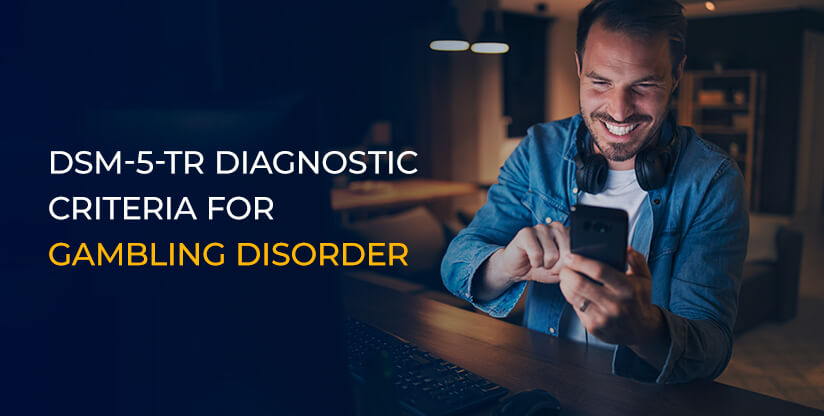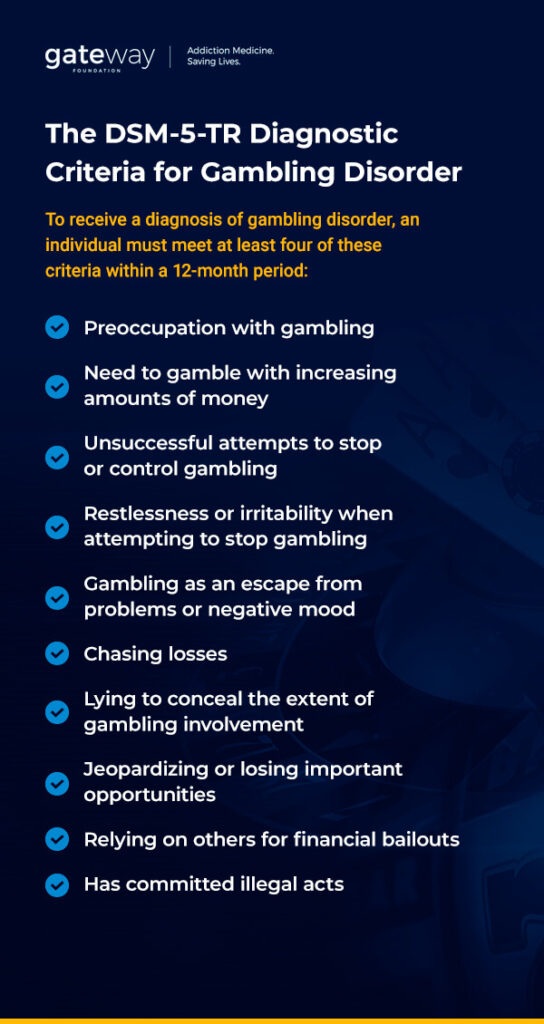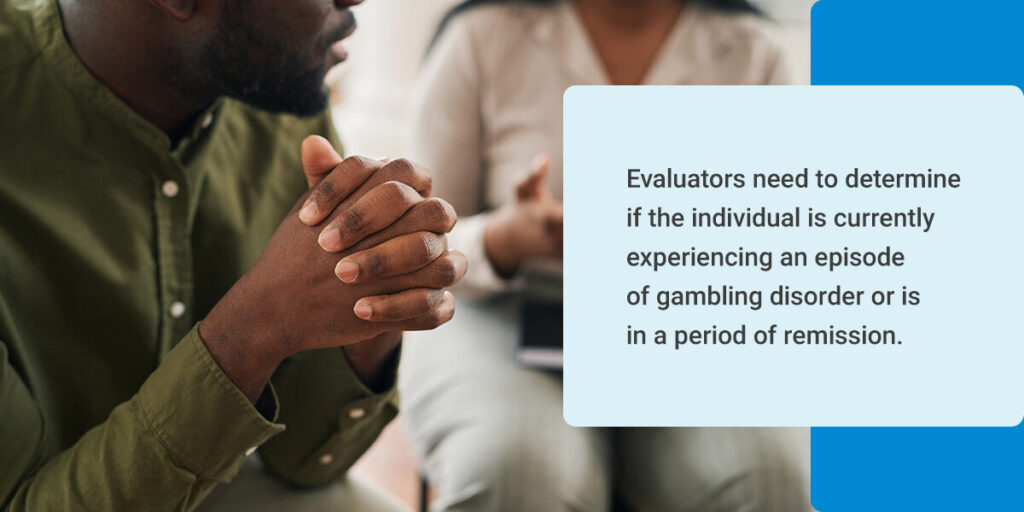- Mar 10
- Addiction

Gambling disorder is a condition that affects millions of people around the world. The disorder can damage lives, tear families apart and lead to significant financial losses. The fifth edition of the Diagnostic and Statistical Manual of Mental Disorders (DSM-5-TR) lists the signs, diagnosis criteria, specifications and treatment options for anyone with a gambling disorder. Here’s how the DSM-5-TR defines gambling and when to seek treatment if you or someone you know is struggling.
The DSM-5-TR Diagnostic Criteria for Gambling Disorder

The DSM-5-TR definition of gambling disorder describes the condition as a persistent and problematic gambling behavior pattern leading to significant distress or impairment. The manual provides a standardized set of diagnostic criteria for various mental disorders, including problematic gambling. To receive a diagnosis of gambling disorder, an individual must meet at least four of these criteria within a 12-month period:
- Preoccupation with gambling: The individual shows an increasing preoccupation with gambling, such as constantly thinking about past gambling experiences, planning future gambling ventures or strategizing ways to obtain money for gambling.
- Need to gamble with increasing amounts of money: The person needs to gamble with larger amounts of money or make more frequent bets to achieve the desired excitement or “rush” associated with gambling. This criterion indicates tolerance, where the individual requires more significant involvement in gambling to achieve the desired effect.
- Unsuccessful attempts to stop or control gambling: The individual has made repeated, unsuccessful attempts to control, cut back or stop gambling. They may have experienced a strong desire to quit gambling but have been unable to do so.
- Restlessness or irritability when attempting to stop gambling: The person experiences restlessness or irritability when trying to reduce or stop gambling. This criterion highlights the withdrawal symptoms associated with discontinuing or reducing gambling behavior.
- Gambling as an escape from problems or negative mood: The individual often uses gambling to escape from problems or negative emotions, seeking relief or distraction through gambling. This criterion suggests that gambling becomes a coping mechanism for emotional distress.
- Chasing losses: The person frequently engages in “chasing losses,” attempting to recoup previous gambling losses by continuing to gamble. This behavior often leads to financial difficulties, exacerbated by increasing bets or larger risks to recover losses.
- Lying to conceal the extent of gambling involvement: The individual often lies to family members, friends or therapists to hide the scope of their gambling activities. They may minimize the amount of time spent gambling or the money lost.
- Jeopardizing or losing important opportunities: The person continues to gamble despite experiencing negative consequences on their relationships, work, education or other significant areas of life. This criterion emphasizes the impact of gambling on interpersonal and functional aspects of the individual’s life.
- Relying on others for financial bailouts: The individual depends on others to offer financial assistance to relieve desperate situations caused by gambling losses. This criterion reflects the individual’s increasing dependence on external support due to the financial consequences of their gambling behavior.
- Has committed illegal acts: The person has committed illicit acts like forgery, theft, fraud or embezzlement to finance their gambling.
The DSM-5-TR diagnostic criteria for gambling disorder provide a standardized framework for professionals to identify and diagnose individuals experiencing significant gambling-related problems. Accurate diagnosis is crucial for appropriate treatment planning and interventions to help individuals overcome the challenges associated with gambling disorder.
Factors That Affect DSM-5-TR Evaluation
When evaluating a gambling disorder using the DSM-5-TR, several factors can impact the assessment process. By considering episode, remission and severity, evaluators can make a more accurate diagnosis of gambling disorder and provide appropriate treatment recommendations. This comprehensive evaluation process is essential for guiding effective interventions and supporting individuals in managing their gambling behavior and improving their overall well-being.
For example, identifying an ongoing episode of gambling disorder may necessitate immediate intervention to address the problematic behavior. On the other hand, if the individual is in remission, treatment may focus on relapse prevention and maintaining positive changes. Here are the factors that affect gambling disorder DSM-5-TR evaluation:
Episode

The presence or absence of an episode is a critical factor in evaluating gambling disorder. Episodes in this context refer to periods during which the individual exhibits significant gambling behavior that meets the diagnostic criteria. Evaluators need to determine if the individual is currently experiencing an episode of gambling disorder or is in a period of remission.
The gambling DSM-5-TR episode specifications include the following:
- Episodic: Meeting diagnostic criteria for more than a single period, with symptoms subsiding between bouts of gambling disorder for at least many months.
- Persistent: Experiencing regular symptoms to meet the DSM-5-TR diagnostic criteria for many years.
Remission
Remission refers to a period during which the individual no longer meets the full criteria for gambling disorder. It is crucial to assess whether the individual is in remission, either early or sustained and consider the duration and stability of the remission period. Remission can occur due to various reasons, such as successful treatment, changes in behavior or external factors limiting gambling opportunities.
The pathological gambling DSM-5-TR specifies remission as:
- In early remission: After meeting the full DSM-5-TR criteria for gambling disorder, none of the symptoms and diagnostic criteria have been met for at least three months but less than 12.
- In sustained remission: After meeting the full criteria for gambling disorder, none of the criteria for gambling disorder have been met throughout the duration of 12 months or longer.
Severity

Evaluating the severity of gambling disorder is crucial for treatment planning and understanding the condition’s impact on the individual’s life. Evaluators need to assess the severity of the condition based on the level of impairment, the degree of distress experienced and the impact on the individual’s daily functioning. Severity can range from mild to moderate to severe, reflecting the extent of the problem and the need for intervention.
The DSM-5-TR specifies the current severity of a person’s gambling disorder as the following:
- Mild: A person must meetfour to five criteria for a mild diagnosis of gambling disorder.
- Moderate: A person must meet six to seven criteria for a moderate diagnosis.
- Severe: A person must meet eight to nine criteria for a severe diagnosis.
The severity of the disorder can guide treatment decisions, with more severe cases requiring intensive interventions and support. Additionally, understanding the severity helps predict the potential impact on various aspects of the individual’s life, such as financial stability, relationships and overall well-being.
Differential Diagnosis in Gambling Disorder
Differential diagnosis is a crucial process in evaluating gambling disorder, as it involves distinguishing it from other conditions that may share similar symptoms or have overlapping features. Accurate differential diagnosis is vital for effective treatment planning and providing the right interventions. Here are some differential diagnoses to consider in the evaluation of gambling disorder:
- Substance use disorders: Substance use disorders, such as alcohol or drug addiction, may co-occur with gambling disorder. Both conditions involve compulsive behaviors and can harm an individual’s life. Evaluators should assess whether the problematic gambling behavior is primarily driven by substance use or if it represents a separate gambling disorder.
- Impulse control disorders: Impulse control disorders, such as intermittent explosive disorder or kleptomania, share features of impulsivity with gambling disorder. Individuals with these disorders may engage in impulsive behaviors, including but not limited to excessive gambling. It is essential to differentiate between gambling and impulse control disorders based on the specific symptoms and underlying motivations for the behavior.
- Bipolar disorder: Bipolar disorder is characterized by recurrent episodes of mania and depression. During manic episodes, individuals may exhibit impulsive and reckless behaviors, including excessive gambling. Differential diagnosis is necessary to determine if the gambling behavior is a symptom of the manic episode or if it represents a separate gambling disorder.
- Attention-deficit hyperactivity disorder (ADHD): ADHD is associated with impulsivity, hyperactivity and inattention symptoms. Some individuals with ADHD may engage in impulsive behaviors, including excessive gambling. Evaluators should consider whether the gambling behavior is primarily driven by impulsivity associated with ADHD or if it meets the criteria for a separate gambling disorder.
- Obsessive-compulsive disorder (OCD): OCD is characterized by intrusive thoughts and repetitive behaviors. In some cases, individuals with OCD may exhibit compulsive gambling as a form of ritualistic behavior. Differential diagnosis is necessary to differentiate between gambling disorder and OCD, considering the primary focus and motivation behind the behaviors.
- Mood disorders: Mood disorders, such as major depressive disorder or generalized anxiety disorder, can co-occur with gambling disorder. It is critical to assess whether the gambling behavior manifests as an underlying mood disorder or if it could be a separate gambling disorder diagnosis.
- Personality disorders: Certain personality disorders, such as antisocial personality disorder (APD) or borderline personality disorder (BPD), may be associated with impulsive behaviors, including gambling. Professionals should consider whether the personality disorder primarily explains the gambling behavior or if it represents a distinct gambling disorder.
Differential diagnosis in gambling disorder involves a comprehensive evaluation of the individual’s symptoms, history and underlying motivations for gambling. It requires careful consideration of the specific criteria outlined in the diagnostic manuals for each disorder. Collaboration with the individual, gathering collateral information and considering cultural and contextual factors further enhance the accuracy of the differential diagnosis process.
By differentiating gambling disorder from other conditions, clinicians can provide appropriate interventions and treatment approaches tailored to the individual’s needs. This helps ensure the most effective management of the gambling behavior and overall improvement in the individual’s well-being.
Questions to Ask Yourself or a Loved One
Diagnosing a gambling disorder can be challenging, but asking specific questions can help you determine whether you or a loved one has problematic gambling behaviors. Recognizing when to seek help is also crucial for managing the disorder effectively.
Questions you might ask yourself or a loved one for diagnosis include the following:
- Have you felt an increasing need to gamble with larger amounts of money to reach the desired thrill?
- Have you tried unsuccessfully to control, cut back or stop gambling?
- Do you feel restless or irritable when trying to cut back or stop gambling?
- Have you found yourself preoccupied with thoughts of gambling or planning your next gambling session?
- Have you used gambling to escape problems or cope with negative emotions like stress, guilt or anxiety?
- Have you lied to your family, friends or therapists about the extent of your gambling activities?
- Has gambling negatively affected your relationships, work or school performance or financial stability?
- Have you borrowed money or sold possessions to finance your gambling habits?
- Have you experienced withdrawal symptoms like restlessness or irritability when trying to stop or reduce gambling?
- Have you engaged in illegal activities, such as theft or fraud, to obtain funds for gambling?
If you or your loved one answered affirmatively to several of these questions, it might indicate the presence of a gambling disorder. However, a qualified health care professional or addiction specialist should make a formal diagnosis. You might also seek professional help if you notice the following signs:
- Increasing loss of control: If you find it difficult to control or stop gambling, despite harmful consequences, it may be time to seek help. This loss of control is a hallmark of gambling disorder.
- Emotional distress: If gambling has become a source of emotional distress, such as feelings of guilt, shame, anxiety or depression, professional assistance can provide support in managing these emotions.
- Financial consequences: If your gambling activities have resulted in significant financial problems, such as debt, inability to pay bills or borrowing money to gamble, it is crucial to seek help to address these financial challenges.
- Relationship strain: When gambling begins to strain personal relationships, such as conflicts with family members, friends or colleagues due to your gambling habits, seeking professional assistance can help address these relationship difficulties.
- Negative impact on work or school: If your gambling behaviors have affected your performance at work or school, including absenteeism, poor concentration or declining grades, it is crucial to seek help to prevent further damage to your professional or academic life.
- Failed attempts to stop: If you have made multiple unsuccessful attempts to control or stop gambling on your own, professional support can provide the necessary tools and strategies for long-term recovery.
- Co-occurring mental health issues: If you are experiencing co-occurring mental health conditions, such as depression, anxiety or substance abuse, along with gambling problems, seeking professional help can address these interconnected issues.
Remember, recognizing the signs of a gambling disorder and seeking help is an essential step toward recovery. Professional assistance can provide a comprehensive assessment, diagnosis and individualized treatment plan tailored to your specific needs. It is never too late to seek help, and with the proper support, you can regain control over your gambling habits and improve your overall well-being.
Get Comprehensive Gambling Addiction Treatment at Gateway Foundation
Many considerations go into diagnosing someone with a gambling disorder. That’s why it’s crucial to seek professional support during this time. Gambling treatment can help you regain control of your life and protect your relationships, finances and overall well-being. At Gateway Foundation, we provide a professional diagnosis and a treatment program that addresses this condition’s unique challenges and complexities.
With our experienced and compassionate team of professionals, we provide personalized care to support your journey toward recovery. To get started, contact us today.



